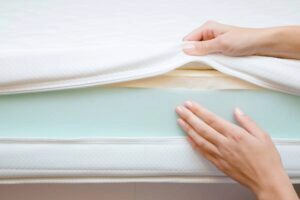Do I Need a New Mattress?
Disclosure: By clicking on the product links in this article, Mattress Nerd may receive a commission fee at no cost to you, the reader. Read full disclosure statement.
Have you grown attached to your mattress and you can’t bear to part with it? Well unfortunately, no mattress is designed to last forever, and you’ll eventually have to get a new bed, especially if you want to make the most of a night’s sleep. The question is, how do you know when it’s time to get a new mattress? Read on to get a thorough breakdown of all the tell-tale signs.
Signs You May Need a New Mattress
Your mattress doesn’t necessarily come with an expiration date, but it does go through an exorbitant amount of wear and tear over the years. You should be on the lookout for the following obvious signs that could indicate it’s time to get rid of your old mattress.
- The mattress is old. How long have you had your current mattress? Most types of mattresses are designed to last no longer than 8 to 12 years before they begin to deteriorate. If you’ve had your mattress for longer than a decade, it may be time to start shopping for a new sleep option.
- The mattress is sagging. Over time, a mattress will naturally sag. This is a normal occurrence. Once your mattress is sagging so much that it’s leaving an impression more than an inch deep, then you should consider getting rid of it. Take a look at our best mattresses that won’t sag article for more info.
- You’re getting poor sleep. Are you tossing and turning at night? Do you have trouble going to sleep and staying asleep? While this could be attributed to a number of different causes, your own mattress could be the culprit. Analyze your sleep habits and see if a new mattress could help you out.
- You wake up with aches and pains. An older mattress that is beginning to break down won’t give you the necessary support for your body. Deteriorating mattresses can lead to spinal misalignment, aggravated pressure points, lower back pain, and many other health issues.
- There is a long-lasting body impression in your mattress. This sign mostly occurs with memory foam mattresses, which are designed to mold to the shape of your body when lying down. When you get up, the memory foam resumes its original shape. If the foam isn’t going back to its original form and instead keeps the impression of your body, the mattress may be heading toward the end of its lifespan.
How to Make Your Mattress Last Longer
While you shouldn’t keep the same mattress for too long, you can still take the proper measures to ensure your mattress lasts a long time while still giving you a good night’s sleep. Here are some ways to increase the lifespan (and sleep quality) of your mattress.
- Conduct regular rotations. You should consider rotating your mattress on its base at least once every few months. This prevents you from putting too much weight and pressure on one specific part of the mattress and reduces the chances of permanent indentations.
- Use a mattress protector. A waterproof mattress protector will keep your mattress surface safe from spills, stains, dust mites, bed bugs, and other potential issues that can harm the mattress’s integrity.
- Add a mattress topper or mattress pad. A mattress topper or a mattress pad is a thick slab of material that you put on top of your bed surface to soften it. By having one of these on your mattress, you can further protect the surface and prevent sagging for a long time.
- Clean the mattress and sheets properly. In addition to regularly cleaning your bed linens and mattress cover, you should also ensure you’re washing the mattress properly as well. You don’t need to do any regular maintenance, but in the event of a stain or other issue on your mattress, you should make sure you’re following the manufacturer’s directions for cleaning.
- Provide adequate support for your bed. A mattress needs the right base and bed frame, not just for your comfort, but also for its own benefit. A solid foundation will make sure your mattress is properly and evenly supported.
- Be careful with moving your mattress. If you plan to move, or you simply want to rearrange furniture in your home, then you should take the right steps to protect your mattress. Avoid bending or folding your mattress, and see if you can use some type of protective sleeve or box to keep it from facing any damage.
How to Choose a New Mattress
When you decide to finally shop for a new mattress, you’ll need to be smart. After all, buying a good mattress is a major investment, and since we spend a third of our lives in bed, you’ll want a high-quality sleep option. Below are a few things to consider when choosing the right mattress for yourself.
Sleeping Position
Each sleeping position is best suited to a specific type of mattress surface, mainly in terms of firmness.
Side sleepers will want a softer mattress surface, preferably one made of memory foam or natural latex. Combination sleepers and back sleepers will want a medium-firm hybrid mattress made of a blend of foam and springs, or a mattress with very thick memory foam. Stomach sleepers usually need a very firm mattress consisting of extremely dense foam, tightly packed steel coils, or a mix of both.
Body Type
Mattress firmness is also important depending on your body type. Lighter sleepers who won’t sink into the mattress may prefer a softer sleep surface, such as the kind that comes with memory foam or latex mattresses. Heavier sleepers can sink into a softer mattress and potentially throw off their spinal alignment, which is why they’ll want a firmer innerspring mattress instead.
For our favorite mattresses in each category, check out our best soft mattresses and best firm mattresses articles.
Sleeping Preferences
Your personal preferences also matter when it comes to your sleep experience. Think about how soft or firm you like your mattress. Also, do you like feeling like a mattress is hugging you while you sleep, like with memory foam, or would you prefer something less constricting, such as innerspring or coils? Remember, you spend a lot of time in your bed, so you deserve something that will keep you comfortable.
Conclusion
Everyone has a unique sleep personality, and when we become so accustomed to our beds, we find it hard to let them go. However, you can’t expect to sleep on the same exact mattress your entire life. You’ll eventually need to go with a different mattress option, not just for your comfort, but also for your overall health. You deserve a better sleep experience, and one of the keys to achieving that may be finding a new mattress.


